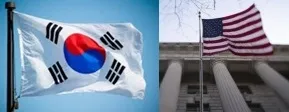What Are the U.S. Demands for Resolving Non-Tariff Barriers with South Korea?

Synopsis
Key Takeaways
- The U.S. has called for South Korea to address non-trade barrier issues.
- Focus on resolving challenges related to tariffs from the Trump administration.
- Key areas of discussion include balanced trade and economic security.
- Trade negotiations aim to benefit both nations economically.
- High tariffs on rice remain a significant point of contention.
Seoul, May 26 (NationPress) The United States has urged South Korea to address several non-trade barrier challenges during their recent working-level trade discussions, as reported by a trade official from Seoul on Monday. This comes as South Korea aims for a reduction or exemption from the tariffs imposed by the Donald Trump administration.
In the latest round of working-level talks, Washington emphasized the need for Seoul to tackle non-trade barrier concerns highlighted in the 2025 National Trade Estimate (NTE) Report on Foreign Trade Barriers, which was published by the US Trade Representative (USTR) office in March. The official, who spoke on the condition of anonymity, refrained from providing further specifics, as reported by Yonhap news agency.
The NTE report outlined various non-tariff measures employed by Korea, such as the import ban on American beef from cattle older than 30 months, South Korea's defense trade policy involving 'offsets', regulations related to emissions for imported vehicles, and pricing practices for pharmaceuticals.
Last week, the two nations conducted their second round of 'technical discussions' in Washington, following an agreement made during a meeting between South Korean Industry Minister Ahn Duk-geun and USTR Jamieson Greer on the sidelines of an Asia-Pacific Economic Cooperation (APEC) trade ministers' gathering held earlier this month on South Korea's Jeju Island.
The discussions focused on six key areas: balanced trade, non-tariff measures, economic security, digital trade, country of origin issues, and commercial factors, as per Seoul's Ministry of Trade, Industry and Energy.
South Korea is actively pursuing either a complete exemption or a reduction of the 25 percent reciprocal tariffs from the Trump administration, along with sectoral tariffs on steel, automobiles, and other imports. The goal is to establish a comprehensive agreement on tariffs and economic cooperation before July 8, when the 90-day suspension on reciprocal tariffs concludes.
While specific details of Washington's requests remain undisclosed, industry analysts suggest that the U.S. may have raised concerns regarding Seoul's beef import policies and substantial tariffs on imported rice.
"Among the requests from the U.S., some can be resolved through regulatory easing, while others involve market access issues that require adherence to trade treaty procedures," stated another senior trade official, who asked to remain unnamed.
Trump has cited South Korea's rice tariffs as an illustration of trade barriers imposed by foreign nations during his announcement of country-specific reciprocal tariffs in early April, asserting that the country imposes duties exceeding 500 percent on U.S. rice.
South Korea's standard tariff on rice imports is 513 percent; however, the country only enforces a 5 percent tariff on an annual import quota of up to 132,304 tons of U.S. rice.










